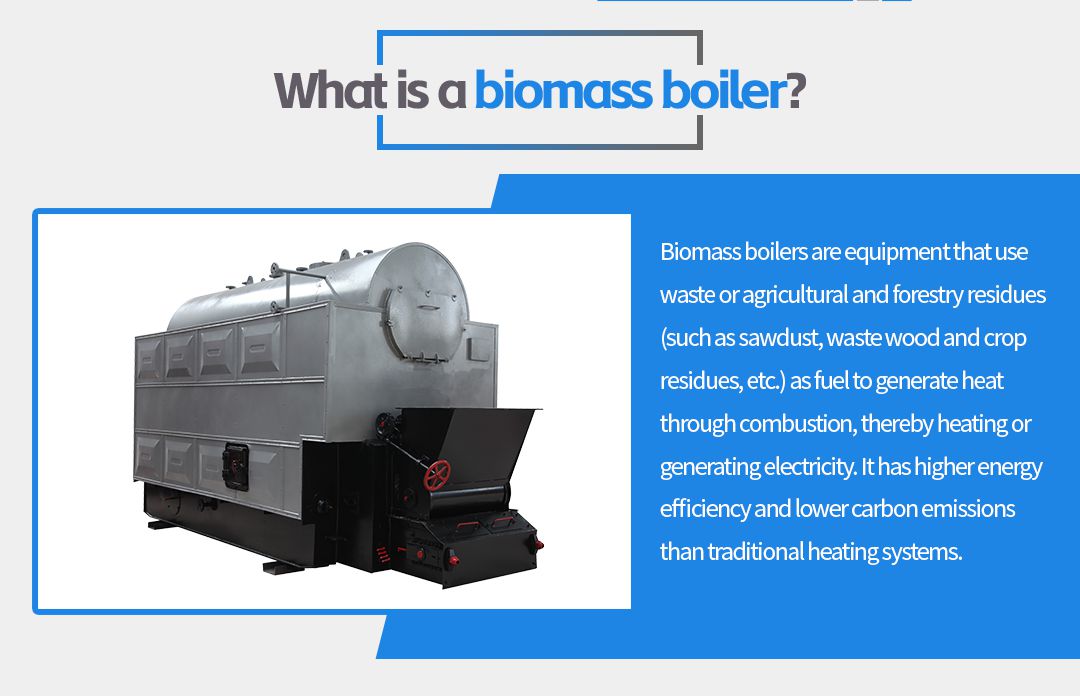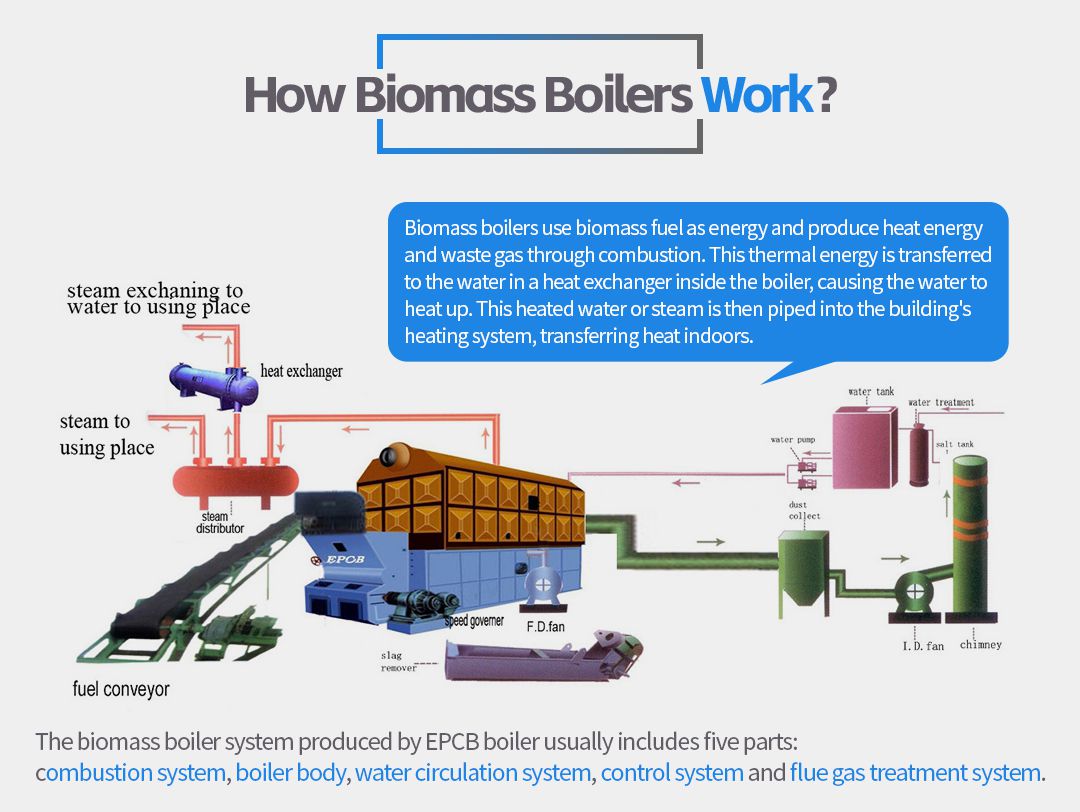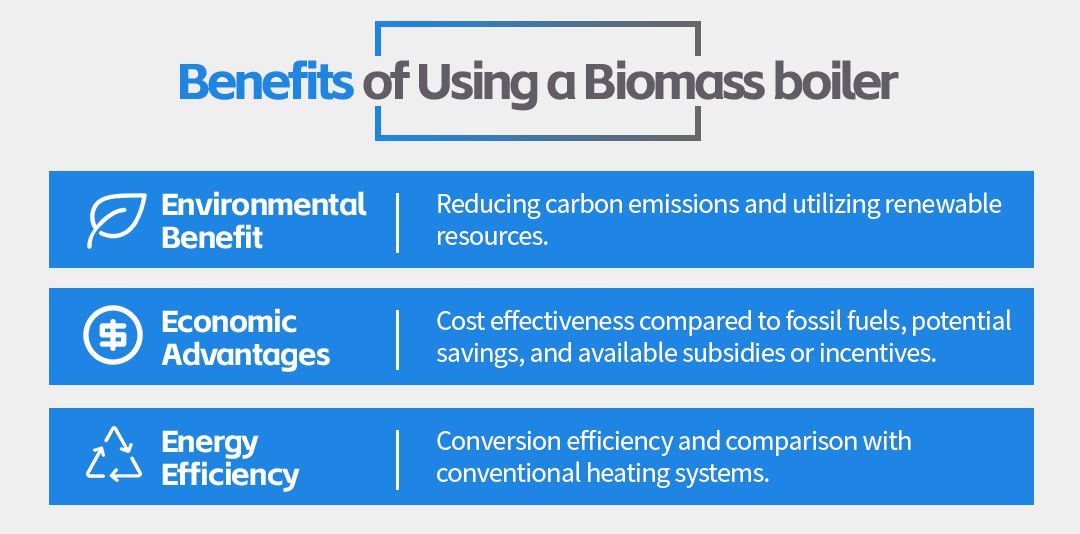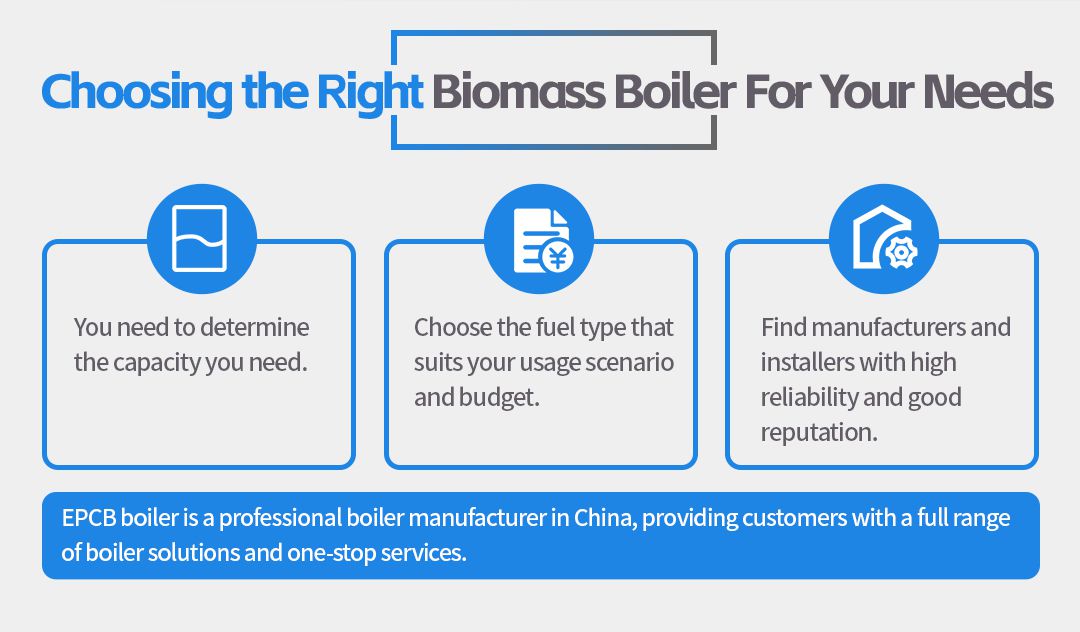Introduction
Today, people are increasingly concerned about environmental sustainability. Biomass boilers are coming into sharp focus as a renewable heat solution. Renewable heating is moving to the forefront of energy sustainability and environmental protection.
Biomass boilers utilize renewable resources, such as wood chips and straw, to be burned and heated to provide hot water and heating for a variety of premises. They play an important role in sustainable heating solutions. They meet heating needs and reduce reliance on finite fossil energy sources. This cuts greenhouse gas emissions and pollution.
An in-depth understanding of biomass boilers and their role in sustainable heating is important for the promotion of renewable energy. This guide will demystify biomass boilers and give you a clearer understanding of this eco-heating solution.
What is a Biomass Boiler?

A biomass boiler uses waste or agricultural and forestry residues (like wood chips, discarded wood, and crop residues) as fuel. It burns the fuel to make heat and thus electricity. It has higher energy efficiency and lower carbon emissions than conventional heating systems.
The biggest difference between a biomass boiler system compared to a conventional heating system is the type of fuel used. Conventional systems use fossil fuels like natural gas or oil. Biomass boilers heat and make electricity by turning renewable resources into energy. These renewable resources include wood pellets, chips, logs, etc.
Using renewable resources as the main energy supply cuts the impact on the environment a lot. It drastically reduces emissions of carbon dioxide and other harmful substances. In addition, it offers competitive advantages in terms of price. We produce and use biomass fuels at a lower cost than imported fossil fuels. This cuts long-term operating costs.
How Biomass Boilers Work

Biomass boilers utilize biomass fuel as an energy source. The fuel is burned to produce heat and exhaust gases, transferred to water in a heat exchanger inside the boiler to warm it up. This water or steam is then transferred to the building's heating system to transfer heat to the interior.
EPCB Boiler's biomass boiler system has five main parts. They are the combustion system, boiler body, water circulation system, control system, and flue gas treatment system.
1.Combustion system:The combustio n system is the core of the biomass boiler. It turns the heat from burning biomass fuel into hot water, steam, or hot air. If a biomass burner is used, the system has a combustion chamber, burner, fuel supply system, and other parts. These parts ensure that the biomass can burn fully to use energy well.
2.Boiler body:The boiler body is the main structure of the biomass boiler. It carries the combustion system and other extra equipment. This includes the water circulation system, steam generator, and so on. The boiler body has a boiler tube, furnace, flue, and water pipe. It is a pressurized container that can handle high temperatures and pressure.
3.Water circulation system:The system circulates hot water or steam from the boiler. It also transfers heat to objects or equipment that need to be heated. The system has components like water pumps, pipes, and heat exchangers. They ensure that heat can be well transferred and used.
4. control system:Th e control system is a smart manager for the biomass boiler. It monitors and controls the boiler to keep it safe and stable. The system usually has control panels, sensors, actuators, and other parts. They can monitor temperature, pressure, flow, and other parameters in real-time. They can also regulate and control based on the set control strategy.
5. Flue gas treatment system: The system treats flue gas. The gas is produced by combustion. It reduces pollutant emissions and the impact on the environment. The system usually includes equipment such as a dust collector, desulphurization device, and denitrification device. They can clean the exhaust gas well and meet environmental rules.
The parts of the biomass boiler work together. They ensure that the biomass fuel is efficiently turned into heat. This heat is used for heating or power.
Benefits of Using a Biomass Boiler

When exploring the appeal of biomass boilers, it is worth starting with its various benefits.
1. Environmental benefits
Biomass boilers are fueled by renewable wood and plant waste. Their use can greatly cut the need for fossil fuels and the harm to the environment. Burning releases as much carbon dioxide as plants absorb. So, a biomass boiler cuts emissions, which fights climate change and slows warming.
Biomass is renewable. It's more abundant and sustainable than limited fossil fuels. Using biomass boilers can cut dependence on limited resources. It also helps protect the environment and biodiversity.
2. Economic Advantages
Biomass fuels are usually more stable and cheaper than fossil fuels. Using biomass boilers can cut energy costs, boost energy efficiency, and save money for users.
Biomass boiler technology has improved. The market has grown. So, the cost of related equipment is falling. Also, many governments and organizations offer subsidies, tax breaks, or other incentives to promote renewable energy. Biomass boilers can enjoy these economic advantages.
3. Energy efficiency
Biomass boilers have a big advantage over conventional heating systems. They are better at converting and using thermal energy. Biomass boilers are usually very efficient. They can make full use of the energy in biomass fuels. They turn the fuel into heat and increase energy efficiency. Biomass boilers are better than traditional coal-fired or oil-fired boilers. They are more energy efficient and produce less waste in combustion. This helps reduce energy use and pollution.
Types of Biomass Boiler Systems

Biomass boiler systems have many types. They vary by automation, combustion method, and fuel type. They are automatic, semi-automatic, pellet, and wood-burning.
1. Automatic biomass boiler system
The biomass boiler uses advanced control technology and sensors. They let the boiler run fully automatically. Users only need to set the parameters. The system can then do the tasks of fuel supply, combustion, and emission control.
Advantages:
The high degree of automation reduces the need for manual operation and improves work efficiency.
A precise control system ensures stable operation of the boiler and improves thermal efficiency.
Remote monitoring and fault diagnosis can be realized, which is convenient for users to manage and maintain.
Disadvantages:
Relatively high initial investment costs, may not apply to small projects.
Higher requirements for the control system, require professional personnel to operate and maintain.
2. Semi-automatic biomass boiler system
Semi-automatic biomass boilers need manual involvement. This is for some tasks, such as adding fuel and cleaning out ash. Compared with the fully automatic system, it has a lower degree of automation, but the operation is relatively simple.
Advantages:
Relatively low investment cost, suitable for small and medium-sized projects.
Operation is relatively simple and easy to master.
Disadvantages:
Requires manual involvement in some operations, increasing labor costs.
Manual operation may lead to unstable combustion and affect thermal efficiency.
3. Pellet-burning biomass boiler system
The boiler system uses pellets as fuel. It converts heat through a specific combustion method.
Advantages:
Biomass pellet fuel is easy to store and transport, and convenient to use.
High combustion efficiency and high calorific value can meet most of the heat demand.
Disadvantages:
The price of biomass pellet fuel may be affected by market fluctuations and the cost is unstable.
Higher quality requirements for fuel, need to choose high-quality biomass pellets.
4. Wood-fired boiler system
Wood-fired head boiler system mainly uses wood as fuel and generates heat by burning wood.
Advantages:
As a renewable resource, wood is widely available and has a low cost.
The ash produced during combustion can be used for soil improvement, which has environmental benefits.
Disadvantages:
The heat generated by burning wood may be unstable and requires reasonable control of the combustion process.
Burning wood may produce some soot and harmful gases. They need effective treatment.
When choosing a biomass boiler system, consider the project's needs, budget, and environmental requirements. For big projects or scenarios with high thermal efficiency requirements, choose automatic or pellet combustion systems. For small projects or scenarios with cost requirements, choose semi-automatic or wood-burning systems. Meanwhile, no matter the chosen system, attention should be paid to the fuel and emission treatment quality. This is to ensure the safe, efficient, and eco-friendly operation of the biomass boiler.
Installation and Operation
The installation of a biomass boiler system is a critical aspect. When choosing a location, ventilation and chimney safety need to be taken into account to prevent several possible accidents. When in use, there are control panels. They are used to run the boiler. It's also important to keep it clean and maintained to its last a long time.
There are several key factors to consider when installing and operating a biomass boiler system. EPCB Boilers is a leading expert in sustainable energy solutions. They have many years of experience with a wide range of biomass boilers. They can provide valuable insight into how to make the installation and operation process efficient and successful.
1. Consider the space requirements of a biomass boiler system
They need fuel storage and delivery systems. So, they need more space than regular heating systems. It is vital to carefully plan the placement of the system so that it does not impede any other operations or create potential safety hazards.
2. Consider proper ventilation
Since biomass boilers produce heat through combustion and emit fumes, proper ventilation is needed to prevent harmful gas buildup. Users can achieve this through natural ventilation or mechanical options.
3. Choose a professional organization for regular maintenance and inspection
Installing is only half the battle. Running a biomass boiler efficiently needs technical knowledge and practical skills. When starting up or shutting down your boiler, follow the manufacturer's instructions exactly. Doing so is crucial, as mistakes can cause malfunctions or damage. You can look for regular maintenance checks by experienced professionals like EPCB Boiler who specialize in this field.
In conclusion, installing and running a biomass boiler needs careful planning. You need this for the best efficiency and longevity. EPCB Boiler is an expert in sustainable energy solutions. We can guide you from the design phase to regular maintenance. We will ensure that your biomass boiler runs well for years!
Maintenance and upkeep
Maintenance is an integral part of any mechanical equipment. Proper maintenance can extend the life of your biomass boiler and improve operating efficiency. During maintenance, you need to pay extra attention to routine cleaning. Also, you need to check combustion equipment and adjust water pressure.
A common problem with boilers is low water levels. They can cause overheating and equipment damage. You can easily avoid this by checking and adding water. Do this according to the boiler maker's instructions.
Another issue is the build-up of deposits or scale in the boiler. This build-up reduces the transfer of heat from the gases to the water. This makes the boiler less efficient. To fix this, you need regular cleaning. Use methods like chemical descaling or mechanical cleaning.
If repairs are needed during an inspection or due to a malfunction, hire a certified technician. They should have experience with boilers and follow safety rules.
At EPCB Boiler, we understand the importance of maintenance for efficient boiler operation. Our team of experienced engineers has top tools. We can provide a custom maintenance service for you. We have a successful track record. We have maintained hundreds of industrial-grade boilers in many industries around the world.
Case Study: Successful Biomass Boiler Implementation
Biomass boilers are sustainable and eco-friendly. They have gotten more attention and favor in recent years. In practice, it reduces dependence on fossil fuels well. It also cuts greenhouse gas emissions. This helps protect our planet.
Many countries have introduced policies in the residential sector. The policies aim to encourage residents to use biomass boilers for heating or hot water. For example, in the forest-rich district of Baden in Germany, the government funds the replacement of old boilers with new biomass ones. It also provides subsidies to encourage residents to join sustainable development programs.
In the commercial sector, large commercial buildings and industrial parks need lots of energy. So, biomass boilers are a good choice because they can supply a lot. In Spain, a big manufacturing company switched from gas to biomass boilers. They cut energy costs by over 50 percent.
This happened in the industrial sector, for example, in a power plant. Near the Turkish capital city of Ankara, they set up a biomass cooling and heating system. This cut net emissions by 30 percent. It also improved energy efficiency and environmental protection.
Of course, there are some challenges when adopting biomass boilers. For example, the unstable supply of raw materials and technical difficulties need to be addressed. However, we can solve these challenges with policy, technology, and related facilities.
Choosing the right biomass boiler for your needs

There are several important factors to consider when choosing the right biomass boiler.
Firstly, you need to determine the capacity you require. This depends on the amount of hot water your business uses daily as well as the size of the space. Generally speaking, small homes can opt for sizes up to 30 kJ/hour; larger businesses may need more than 100 kJ/hour. Ensuring you shop for a product that meets your actual needs can save you money and increase efficiency.
Secondly, it is also important to choose the type of fuel that suits your usage scenario and budget. Different types of biomass boilers can use different types of fuel, such as wood chips, rice husks, and straw. There are also fuel blends that can be used to improve efficiency and reduce pollution emissions.
Finally, when looking for a manufacturer and installer, choose a reliable company. It should also have a good reputation and a lot of experience and expertise. Conduct background checks and refer to customer feedback from their past completed projects. Ensure shopping and installation go smoothly and avoid unnecessary hassles. EPCB boiler is a boiler maker in China. They offer customers a full range of boiler solutions and one-stop service. By choosing an EPCB boiler, you will get high-quality products and full-service support.
The Future of Biomass Heating
A recent report expects that by 2035, 5 million EU households will rely on biomass boilers to heat their homes. In the US and Canada, more and more policies are emerging to support the biomass heating market. Biomass heating has also become an important alternative energy option in Asia, especially in rapidly growing economies such as China and India.
It is a form of renewable energy. It can reduce dependence on fossil energy and cut greenhouse gas emissions. This is in line with the environmental targets set by governments and contributes to the fight against global climate change. Biomass heating is a reliable and accessible alternative to clean energy. It is for areas without traditional clean energy sources like hydropower and wind power.
Conclusion
Biomass boilers are the future of sustainable heating. They also show industry-leading innovation and reliability. EPCB boilers are famous for their great design, efficient energy conversion, and outstanding performance. By reducing carbon emissions, utilizing a wide range of biomass fuels, and providing economic advantages and environmental benefits, it creates considerable value for the user. The clear installation and operation programs, plus careful maintenance and servicing, also boost users' trust in biomass boilers. We should adopt biomass boiler technology. It is a key part of the drive for energy transformation. We should work together to build a cleaner, more sustainable future.
 Steam Boiler
Steam Boiler Thermal Oil Boiler
Thermal Oil Boiler Hot Water Boiler
Hot Water Boiler Steam Boiler
Steam Boiler Thermal Oil Boiler
Thermal Oil Boiler Hot Water Boiler
Hot Water Boiler Steam Boiler
Steam Boiler Thermal Oil Boiler
Thermal Oil Boiler Hot Water Boiler
Hot Water Boiler Steam Boiler
Steam Boiler Hot Water Boiler
Hot Water Boiler

























